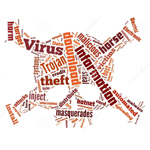 For many people, antivirus software has seemed to be something that never change and do the exact same thing over the years: it runs in the background, downloads updates, and seems to make computers run slower and slower over time. For these people, antivirus is just another bloatware that "should be present" in computers. Concerning this, Symantec, the longtime maker of Norton products, is finally changing its strategy and doing something new.
For many people, antivirus software has seemed to be something that never change and do the exact same thing over the years: it runs in the background, downloads updates, and seems to make computers run slower and slower over time. For these people, antivirus is just another bloatware that "should be present" in computers. Concerning this, Symantec, the longtime maker of Norton products, is finally changing its strategy and doing something new.
Symantec, the American technology company that is headquartered in Mountain View, California, U.S. which makes security, storage, backup and availability software and offers professional services to support its software since 1980s, suggests that antivirus actually leaves users vulnerable. Especially when the internet is already a common phrase today.
On May 4th, 2014, Brian Dye, Symantec's Senior Vice President for Information Security, said that antivirus "is dead." Dye is leading Symantec toward a new approach that focuses on spotting hackers within a system and minimizing damage they do instead of trying to keep them out. "We don't think of antivirus as a moneymaker in any way," he said.
Dye said that hackers increasingly use methods and bugs in the software of computers to perform attacks, resulting in about 55 percent cyberattacks going unnoticed by commercial antivirus software.
This failure from antivirus to detect issues is forcing Symantec to diversify its products, moving into the "detect and respond" sector rather than the simple "protect" segment.
"If customers are shifting from protect to detect and respond, the growth is going to come from detect and respond," said Dye.
The switch to the detect and respond means tracking data leaks, hacks and other intrusions and preventing further repercussions from stolen data. For users, that means changing passwords, but for businesses that often means stopping access to accounts and services that have been subject to data loss or infiltration, as well as tracking the source of the intrusion.
Although Symantec's antivirus products make up about 40 percent of the company's revenue, this isn't a surprise for Symantec that its products have barely made any new innovations in the security market in years.
What Dye was saying is that the current malware environment is full of hackers that focus on cyberattacks such as denial-of service, spear phishing and network intrusion rather than mass-emailing executable files to spam inboxes.
With only about 45 percent of cyberattacks detected from antivirus software, Symantec definitely needs a turnaround. Though the company won't retire its Norton products in favor of the new projects, it's looking ahead to other areas in order to find its place in the ever-evolving security market.
Saying that antivirus "is dead" might seem like an odd statement from a company that is long been known to be one of the most popular antivirus maker. But according to a Finnish security company F-Secure, it's a fact. The current trends are fast moving away from PCs.
"If someone thinks that antivirus being dead is news then we don't know in what world they have been living in for the past five to six years," said Timo Laaksonen, Vice President of Content Cloud at F-Secure.
Declining PC sales and the rise of mobile devices have led to users wanting to access files on the go from their devices at all times. It's a shift that has spawned the cloud industry, which F-Secure see as new battleground for security.
In the recent months, Symantec is following the lead of a number of smaller cybersecurity companies who are finding innovative methods to deal with new types of threats. Symantec partnered with IBM and announced a new cybersecurity offering to protect networks and critical data from zero-day attacks by detecting irregular patterns in network traffic. Meanwhile, Juniper, a manufacturer of networking equipment, announced earlier this year that it's expanding its Firefly suite of products which aims to bulk up business firewalls and the wider network perimeters. The company is also forcing to put "ghost armies" of fake data within internal networks in efforts to distract hackers from the real corporate information. Cisco is also pushing harder on its enterprise solutions in order to prove that the outer edges of the network is just as important as the desktop end-point services.
Other companies like FireEye, for instance, bought Mandiant for $1 billion in January in efforts to improve its response efforts. The company's CEO David DeWalt said one of the reasons for acquiring the company was to receive the first call companies make after an attack.
Malware has become more and more complex and sophisticated in a post-Stuxnet world. Computer viruses range from relatively simple criminal attacks, where credit card information is targeted, to espionage programs that spy on users and data but can easily be upgraded into cyberweapons at the touch of a button, according Eugene Kaspersky, a security expert and founder of Kaspersky Lab.
Categories of cyberattacks have since multiplied and now include all typical network attacks to almost everything people can think of to exploit all information from a targeted device. And with the shift toward network security, it's clear that the traditional desktop-running antivirus market isn't going to have a bright future.
"We aren't just protecting PCs these days, we're protecting people's identities and their privacy across every device they use," Laaksonen says.
